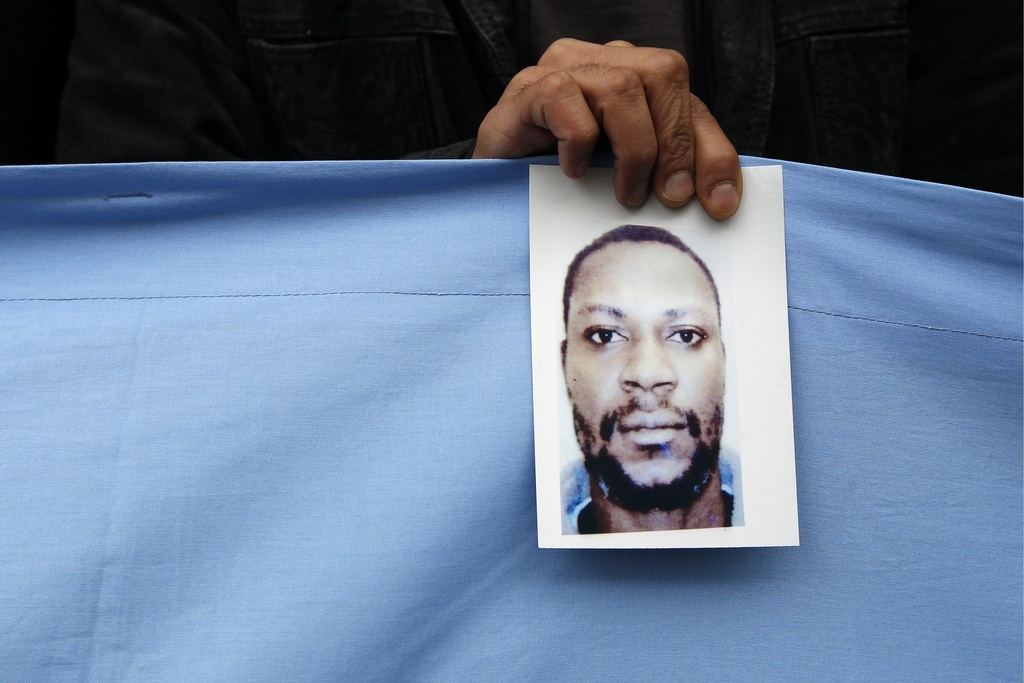Plans mooted to speed up asylum procedure

Despite critical voices from all sides, the government has presented measures to speed up and streamline asylum procedure.
In a bid to make Switzerland less attractive to asylum seekers, the legal amendment, which is subject to approval by parliament, foresees shortening the deadline for appeals and preventing multiple applications for the same person.
It also seeks to suspend the possibility of lodging an asylum request at a Swiss embassy. The government said Switzerland was the only country in Europe that provided this “very expensive” option.
The cabinet proposes funding an independent advisory service for asylum seekers.
“Our aim is to administer as many cases as possible at the asylum centres in border regions,” said Justice Minister Eveline Widmer-Schlumpf at a news conference on Wednesday.
She said the cabinet was confident of making the procedure more efficient, fighting abuses more consistently and upholding Switzerland’s humanitarian tradition.
“People who need protection will continue to get it,” Widmer-Schlumpf said.
The number of asylum seekers rose from 10,844 in 2007 to just over 16,000 last year, prompting criticism from rightwing politicians.
A previous reform of the asylum law, in force since 2008, aimed to speed up the repatriation of rejected asylum seekers.
“Outraged”
As with the two consultation sessions last year, Wednesday’s proposals have been criticised by leftwing parties, refugee organisations and the church.
The Swiss Refugee Council said the government’s plans to reduce the deadline for appeals from 30 to 15 days would limit the protection of refugees. It said clearer regulation was needed to safeguard constitutionally correct practice.
“It is very much to be regretted that the government wants to speed up the process solely at the cost of the refugees,” it said it a statement.
“Even today one can see that this ‘streamlining’ will fall short – it’s no secret that the actual problems lie in enforcement.”
Amnesty International said it was “outraged” by the plans to suspend embassy asylum applications.
“This would result in persecuted people having to undertake long and often dangerous journeys without being able to lodge an asylum request at a Swiss embassy in their home region,” said Denise Graf, refugee coordinator at the Swiss section of the human rights organisation.
“Amnesty International has often spoken up for people in Turkey and Colombia who were only able to leave their country because of this option.”
Flood of deserters?
On the other side of the political spectrum, the rightwing Swiss People’s Party, which fell out with Widmer-Schlumpf , eventually ejecting her from the party after the 2007 federal election, said the policy was “playing to the gallery”.
In a statement the party said Widmer-Schlumpf had finally tackled asylum procedure after two years in office, but what she had proposed “didn’t even begin to solve the problem”.
The People’s Party said the issue of deportations and Nigeria remained open – in March a deported Nigerian, a drug dealer who had been on a hunger strike, died in Zurich after being forcibly restrained for a special flight back to Lagos.
It added that the federal administrative court’s decision that enabled conscientious objectors from other countries to come to Switzerland would “open the door to deserters from all around the world”.
As for the 15-day deadline, the People’s Party believed this was still too long compared with other countries.
swissinfo.ch and agencies
According to the Federal Migration Office, “a refugee is a person who in their native country or in the country of last residence is subject to serious disadvantages or has a well-founded fear of being exposed to serious disadvantages for reasons of race, religion, nationality, membership of a particular social group or political opinion”.
It defines serious disadvantages as “threat to life, physical integrity or freedom as well as measures exerting an unbearable psychological pressure. Flight motives specific to women are taken into account”.
The 1951 Refugee Convention establishing the UNHCR spells out that a refugee is someone who “owing to a well-founded fear of being persecuted for reasons of race, religion, nationality, membership of a particular social group or political opinion, is outside the country of his nationality, and is unable to, or owing to such fear, is unwilling to avail himself of the protection of that country”.

In compliance with the JTI standards
More: SWI swissinfo.ch certified by the Journalism Trust Initiative













You can find an overview of ongoing debates with our journalists here . Please join us!
If you want to start a conversation about a topic raised in this article or want to report factual errors, email us at english@swissinfo.ch.